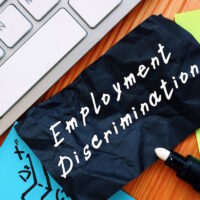Religious Discrimination Lawsuit Alleging Worker Denied Religious Accommodation Filed By EEOC

On September 14, 2020, the U.S. Equal Employment Opportunity Commission (EEOC) issued a press release announcing that it has filed a religious discrimination lawsuit against Wellpath, LLC (Wellpath). On September 14, 2020, the EEOC filed the lawsuit, U.S. Equal Employment Opportunity Commission v. Wellpath, LLC, Case No. 5:20-cv-1092, in the U.S. District Court for the Western District of Texas. Prior to commencing the civil action in federal court, the EEOC attempted to resolve the case through the agency’s voluntary conciliation program. Conciliation efforts having failed, the EEOC elected to remedy the alleged unlawful discriminatory employment practices by filing the lawsuit. In this article, our Ocala, Florida labor law attorneys explain the EEOC’s allegations of unlawful religious discrimination against Wellpath.
Religious Discrimination Victims’ Rights
The EEOC has brought the religious discrimination lawsuit under Title VII of the Civil Rights Act of 1964 (Title VII) on behalf of an individual who sought employment with Wellpath, Malinda Babineaux (Babineaux). Title VII makes it an unlawful discriminatory employment practice for employers to discriminate against employees and job applicants on the basis of religion. Under Title VII, employers are also required to reasonably accommodate the religious beliefs of employees and job applicants when they conflict with employment requirements, short of incurring undue hardship. When an employer fails or refuses to accommodate an employee’s or job applicant’s religious belief that conflicts with an employment requirement, and then uses the employee’s or job applicant’s inability to comply with the employment requirement as the basis for an adverse employment action, the employer has unlawfully discriminated against the employee or job applicant on the basis of religion in violation of Title VII, unless the employer establishes that accommodating the employee’s or job applicant’s religious belief would have imposed undue hardship.
The EEOC claims that Wellpath discriminated against Babineaux in violation of Title VII by failing or refusing to grant her a reasonable accommodation for religious beliefs and failing to hire her because of her religion.
Worker Claims Religious Discrimination
Wellpath, which is based in Tennessee, is a provider of health care services to correctional facilities. Babineaux is a member of the Apostolic Pentecostal Christian church. The EEOC alleges that Wellpath failed to grant a religious accommodation to Babineaux after she requested to wear a scrub suit instead of scrub pants to her position as a nurse at the CEO Central Texas Correctional Facility. Babineaux requested this accommodation, according to the EEOC, to comply with her sincerely held Apostolic Penecostal Christian religious beliefs. In response to this request, Wellpath denied the accommodation and rescinded Babineaux’s offer of employment. Allowing Babineaux to wear a scrub skirt, the EEOC contends, would not have caused undue hardship to Wellpath because Babineaux could fully perform the duties of the nurse position while wearing a scrub skirt. In fact, the EEOC maintains, Babineaux has worn a scrub skirt for several years while working in medical settings in correctional facilities.
Labor Law Attorneys
The EEOC is the administrative agency of the United States charged by federal law with interpreting and enforcing federal employment and labor laws prohibiting discrimination, harassment, and retaliation. In protecting employees’ rights under the federal employment and labor laws, the EEOC brings lawsuits on behalf of employees who have been subjected to unlawful discriminatory employment practices. In a press release issued by the EEOC on September 14, 2020 regarding the case, a trial attorney for the EEOC’s San Antonio Field Office, Phillip Moss, explained that “this nurse has treated patients and performed her job successfully while wearing a scrub skirt before.” “The EEOC is committed to enforcing laws,” Mr. Moss added, “that protect employees in the workplace from discrimination on the basis of religion.” In commenting on the case, a supervisory trial attorney for the EEOC’s San Antonio Field Office, Eduardo Juarez, stated that “employers are required to reasonably adjust their dress codes to accommodate the religious beliefs of applicants or employees, unless those actions would constitute an undue hardship.”
Labor Law Lawyers In Ocala, FL
Based in Ocala, Florida and representing employees throughout Central Florida, our Marion County, Florida labor law attorneys have litigated employment discrimination cases in Florida courts for more than two decades. If you need protection from discrimination in the workplace or have questions about your rights under the federal employment and labor laws, please contact our office for a free consultation with our Ocala, Florida labor law lawyers. Our civil rights law firm takes employment discrimination cases on a contingency fee basis. This means that there are no attorney’s fees incurred unless there is a recovery and our attorney’s fees come solely from the monetary award that you recover.


 Close Menu
Close Menu